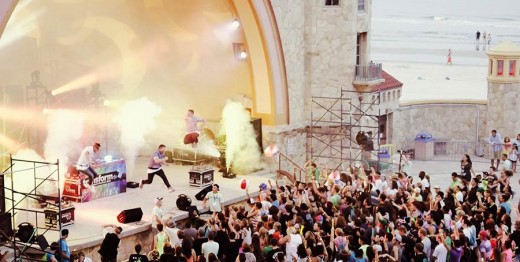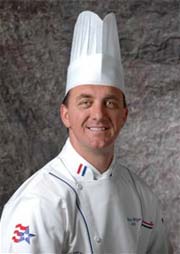Please fill out the following information, and RRFC Admissions will contact you to discuss our program offerings:
Issue #104 - Page 2
by L. Swift and Jeff McQ
 RRFC: What qualities do you look for, personally, in an apprentice that you bring into your studio and teach?
Taylor: Definitely somebody who’s willing to learn and really put in the effort to learn, not just sit and absorb but actually participate…Somebody who’s somewhat of a go-getter, or somebody who wants to continually be involved and help with stuff, not just sit around and observe.
RRFC: What kinds of things, in your opinion, can apprentices do to get ahead, to potentially secure a job in the future?
Taylor: Really stepping up and going above and beyond what is expected from an apprentice. Looking and seeing what needs to be done. Do those cables need to be wrapped, or does this need to be done, or what do you need help with, versus just sitting and waiting for instructions. Because a good audio engineer or a system engineer needs to be able to take initiative on stuff, and not be told to do every single little thing.
RRFC: Are there any active apprentices of yours who are really doing a nice job?
Taylor: Yeah. I’ve got a few really good guys right now. One of them’s named Guy [Pressler] and the other one’s Matt [Krening]… Matt’s actually started his own company doing live sound and doing live tracking. So he’s definitely kicking some butt…[Guy is] more dance-oriented just like I am. And he’s not as far in the program as Matt, but I’ve definitely seen his productions go up a notch and his sound’s definitely gotten better, he’s getting better at mixing. I can see him developing a sound more and more…Miguel [Velgara] just recently started his apprenticeship here with me and I am very impressed with how perceptive he is. If something needs to be done, he takes the initiative, makes sure it needs to be done and then does it! In this industry you have to be able to read minds to an extent, so this is a great quality in a student.
RRFC: What do apprentices need to understand most regarding working with clients in the studio?
Taylor: The client is always right, to an extent. Sometimes you have a client or something that is just…I had a client ask one time for me to put the bass on the left side and the kick on the right side. For those kinds of situations, you need to explain those certain things that you always do… But most of the time, the client’s right, so you have to…even if it’s not your favorite creative decision in the mix or something and you think it should sound A and they think it should sound B, it’s their baby and their track, so you’ve got to let them make their creative decision.
RRFC: When it comes to marketing yourself towards potential clients, do you have any other advice to the younger basic engineers?
Taylor: Yeah, basically number one is you can’t market your gear, because no matter what, somebody’s got better gear, or a better studio, or better this or whatever. You just really have to market how you are different and how you can specialize in what they need specifically, and not just you’re a guy who can record stuff, because there’s plenty of those.
Learn more about Taylor’s mastering services at electronicmusicmastering.com.
RRFC: What qualities do you look for, personally, in an apprentice that you bring into your studio and teach?
Taylor: Definitely somebody who’s willing to learn and really put in the effort to learn, not just sit and absorb but actually participate…Somebody who’s somewhat of a go-getter, or somebody who wants to continually be involved and help with stuff, not just sit around and observe.
RRFC: What kinds of things, in your opinion, can apprentices do to get ahead, to potentially secure a job in the future?
Taylor: Really stepping up and going above and beyond what is expected from an apprentice. Looking and seeing what needs to be done. Do those cables need to be wrapped, or does this need to be done, or what do you need help with, versus just sitting and waiting for instructions. Because a good audio engineer or a system engineer needs to be able to take initiative on stuff, and not be told to do every single little thing.
RRFC: Are there any active apprentices of yours who are really doing a nice job?
Taylor: Yeah. I’ve got a few really good guys right now. One of them’s named Guy [Pressler] and the other one’s Matt [Krening]… Matt’s actually started his own company doing live sound and doing live tracking. So he’s definitely kicking some butt…[Guy is] more dance-oriented just like I am. And he’s not as far in the program as Matt, but I’ve definitely seen his productions go up a notch and his sound’s definitely gotten better, he’s getting better at mixing. I can see him developing a sound more and more…Miguel [Velgara] just recently started his apprenticeship here with me and I am very impressed with how perceptive he is. If something needs to be done, he takes the initiative, makes sure it needs to be done and then does it! In this industry you have to be able to read minds to an extent, so this is a great quality in a student.
RRFC: What do apprentices need to understand most regarding working with clients in the studio?
Taylor: The client is always right, to an extent. Sometimes you have a client or something that is just…I had a client ask one time for me to put the bass on the left side and the kick on the right side. For those kinds of situations, you need to explain those certain things that you always do… But most of the time, the client’s right, so you have to…even if it’s not your favorite creative decision in the mix or something and you think it should sound A and they think it should sound B, it’s their baby and their track, so you’ve got to let them make their creative decision.
RRFC: When it comes to marketing yourself towards potential clients, do you have any other advice to the younger basic engineers?
Taylor: Yeah, basically number one is you can’t market your gear, because no matter what, somebody’s got better gear, or a better studio, or better this or whatever. You just really have to market how you are different and how you can specialize in what they need specifically, and not just you’re a guy who can record stuff, because there’s plenty of those.
Learn more about Taylor’s mastering services at electronicmusicmastering.com.



Martin Gilligan

RRFC is education upgraded for the 21st century.
Get the latest career advice, insider production tips, and more!
Please fill out the following information, and RRFC Admissions will contact you to discuss our program offerings:
Stay in the Loop: Subscribe for RRFC news & updates!
© 2025 Recording Radio Film Connection & CASA Schools. All Rights Reserved.



